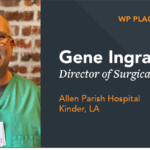Revisiting The Resume
A conversation with Sherry Cox, Director of Talent Acquisition and Development for Emergency and Surgical Services with Hospital Corporation of America (HCA), Krystal Atkinson, Chief Nursing Officer of Portsmouth Regional Hospital (HCA), and Josiah Whitman, Managing Partner, Whitman Partners.
Whitman Partners: How important is the resumé? Is that the first thing to look at when hiring for a vacant position?
Sherry Cox: It is not always the first thing we go to, but I would say for a cold call, if this is the first introduction we’ve had to this applicant, then the resumé is exceptionally important. We really want a resumé that will capture our attention and sell the story of this candidate.
Krystal Atkinson: Whether this is a person that has been referred to us or it is just something that just ends up on my desk, I look at the order of it. I look at how neat it is. I look at how professional it appears. I think it’s a glimpse into how well they manage themselves.
Josiah Whitman: The resumé is definitely our #1 resource. At any time we are searching for several dozen jobs, so the resumé is often all we have to decide whether to call someone and pitch them an opportunity. But there is a lot that resumés do not cover, like geographic preferences, retirement plan, family concerns. The resumé is frequently about “where have I been” and not “where I am going.” So while it’s just the first step in the conversation, it’s a crucial first step.
WP: When you are looking at a new resumé, what do you want to really jump out at you?
SC: After looking at the organization and the flow, I look at the executive summary or the objective statement. I don’t want to see something that is so generic that I know that they are using a shotgun approach and sending this out to a lot of hiring managers. I like to see something that is very specific, that shows that they have done a little homework about the organization to which they are applying.
I also want to see some measurable accomplishments in their resumé. I don’t want to see them write essentially a job description of each role that they’ve had. I really want to see what they’ve accomplished and some measurements that can help me to distinguish them.
KA: When we are looking at distinguishable measurements, I like to focus on the people aspect. I want to hear how the staff was engaged, what were turnover stats, and how was retention. These are the elements that I want to see emphasized.
JW: The objective line is important to me because it’s an opportunity for the candidate to do what is necessary without making a misstep. And it’s often the first thing that you need. If I get an objective line that says, “to be a Director of Quality,” then I know that this person is not truly focused on being a Director of Surgical Services. And that’s a big misstep. Another is if they say, “I’m interested in getting a Director of Surgical Services role in Texas, Oklahoma, or Arizona,” yet they are applying for a position in Washington then I know that I’m dealing with someone whose attention to detail, or possibly their veracity, is in question. The first thing that jumps out to me is a well-researched objective line in relation to the position that they are applying for.
WP: How frequently do you see a resumé that is a homerun in terms of qualifications, but the lack of attention to detail is a concern? If it’s a really tough position to fill, are you willing to overlook the resumé? Or do you draw some pretty hard lines there?
SC: It depends upon the content of the resumé. Attention to detail is important and we are attentive to that, but we consider the entire resumé for a qualified candidate. Typically at this level, people are careful in their resumé creation and don’t often make those missteps. Or at least by the time I have the opportunity to review the resumé, those that are carelessly written have been eliminated.
WP: Among the position of Director of Surgical Services there is still a wide scope of jobs. There are different sized hospitals, specialties, etc. Are there any attributes or skills that you consider to be a “must have” no matter what position you are filling?
SC: I want to see that their degrees and experience match the posting requirements. I do not want to see somebody applying for a Director of Surgery position who has never worked in a surgery setting before. But what really is the “must-have” is their outcomes and emphasis on people. And by “people” I’m including the patient and the staff. What did you do to develop staff? And what kind of outcomes have you had there? And then service. It’s crucial that their resumé speaks to me about their service heart and their service mentality, and how they lead strategies for service. The other things sort of fall in place if you get the people and the service qualities right.
KA: I think for me you need previous experience, especially in the O.R. It is a different language, and if you don’t have that you can get lost in the weeds. It really decreases your credibility.
WP: On the flip side, then, what is maybe not as important that people emphasize too frequently or too much?
SC: I see a lot of descriptions of duties and responsibilities for each position held. And it looks as though the applicant has spent a lot of time thinking through exactly what it was that they were supposed to do in that particular role. But that is just a job description. That does not tell me how they performed those duties.
KA: I also think the level of previous experience is not a deal-breaker for me. But if the resumé lines up, you are seeing what you need, and if the phone screen goes well then you get a sense of that person and whether they’re really going to be able to excel.
WP: Since you mentioned the word “deal-breaker,” I’m going to jump ahead and ask, “Are there any deal-breakers?”
SC: Absolutely. On resumé review, a very basic deal-breaker is an exceptionally sloppy resumé, with grammatical errors and typos. Also if there is negativity about prior employment or unexplained gaps in the resumé. Neither of these serves a serious applicant well.
KA: I like to really focus on behavioral-based questions. If they cannot give me a specific example of when they have had a confrontation with somebody and they can not fill in the blank, I’m really skeptical.
WP: What are your feelings on degrees in progress versus people who are already accredited?
SC: It depends upon which degree it is. If it’s a Bachelor’s Degree and they have an Associates Degree, it’s really dependent upon where they are in pursuit of that degree. If they’ve just started their Bachelor’s Degree, and a Bachelor is the minimum requirement for that job, I’m probably not as likely to select that candidate at that time. Maybe I’d recommend some further development before they apply for a Director role. But it’s not an absolute negative if other qualifications are present.
JW: Since we fill the Director of Surgical Services role for this giant cross-section of jobs, I look on those resumés for degrees that are truly important. And in my world, it’s the BSN. So for example, I will search for a small, tiny hospital in Nebraska and I will talk to a candidate and they will say, “Oh, they won’t look at me there because I don’t have my Master’s in hand.” And I’ll say, “Not necessarily. They would be happy to have someone with a BSN.” There are certainly hospitals that require a Master’s degree, but I want to see the BSN. And if you have a Master’s in progress, we are still talking.
WP: What are some of your top priorities when you first open a job and the resumés start pouring in?
SC: The top priority when reviewing the resumé is: Do they meet the basic requirements of the role? Have they had experiences that suggest success in this role? Do I see on the resumé an appetite for service and people and growth initiatives? After that, the top priority is a cultural fit. And how do we ensure that this applicant is the right fit for the role we are trying to fill?
WP: Are you talking at that point about setting up a phone interview?
SC: Oh, yes. Cultural fit cannot be determined by reviewing the resumé.
KA: This is such a hard role to fill that I would probably prioritize experience and what else I think would be a good fit. And then start the phone screening process from there.
WP: Sherry, your role is to develop people for HCA. Are you sometimes looking just to fill a role, or do you always have an eye open for developing someone into a larger position?
KA: My background is surgical services, so for me, if someone presented as a good fit for the organization and were strong clinically but were lacking a little of the leadership, I feel like I could mentor them. Somebody that is a CNO that maybe has a critical care background and has no idea what to do in surgery may not feel as comfortable with that. So I think that plays a role in it. At the end of the day, we need to be able to mentor everybody. But if you’re going to take the chance to have somebody in such a crucial role in your organization, you need to be able to have a strong mentor for them.
SC: We like to consider development potential and future roles for each candidate we interview. This has much to do with knowing the candidate’s aspirations, potential, and mobility. Our goal is to get them connected with the people who can help them reach their goals.
KA: One of the things that I do is to take the opportunity, especially when someone is new to HCA, to provide them with the depth and breadth of services we have across the country. When I see young talent come in and realize that they might not be married to the Northeast for their entire career, I like to share with them that we have the opportunity within this company to have movement. It is a great recruitment bonus, if you will, that we have that opportunity within the company. So if people get to a place and they are growing out of their job and looking for the next thing, we do not have to lose them from HCA.
JW: I think it is so funny that I have such a different perspective on this one. If I have a candidate that sends their resumé in for a specific job and they say to me, “But I really want to be a Chief Nursing Officer,” or “I’ll take this job in Tennessee but really I want to be in Florida,” that’s such a big warning sign. And I can not pursue that candidate. I understand that HCA can pursue that candidate because they have this footprint and you may want to capture that talent. But that is not my job order to fill. My job order is to fill that one director job in Tennessee.
KA: Sherry and I have worked really hard with people in mentoring them, and you want to be able to identify that growth potential. So if somebody came to me and said, “You know, I am excited to accept this new position but my ultimate goal is something else,” I can work with that. When interviewing I ask, “What do you plan to be doing in the next three to five years?” If this is great talent, I want to be able to take it and nurture it while I have it. So I have the responsibility to open them up to the resources of HCA. But likewise, my expectation would be that they would also have their cessation plan. I expect that of all my leaders. Good leaders identify talent and nurture them to grow into the next role, so if they leave for that dream job or win the lottery, the unit is not left without leadership, even as interim.
WP: When you have candidates in hand, do you share their resumés at an early stage with surgeons and other leadership people on the team?
SC: Absolutely. We have a tremendous emphasis on team. Selecting candidates is not a solo sport, particularly in surgery. The surgeons get involved, especially officers. From my perspective when we schedule a candidate for peer interview panels at the facility, there will often be a whole team of surgeons who are involved in that conversation, as well as anesthesiologists.
KA: I agree. We want to make sure that we include their potential respective peers. So I pull people that report directly to me. I also pull people that are in ancillary areas, and it is good to get a variety of viewpoints. This Director has to work with everybody.
SC: And when we are doing these panel interviews, it is interesting to watch and see the aptitude of this candidate to develop strategic relationships with stakeholders throughout the organization. We want to know that they can reach out to those people that are not in their narrow sphere, but that they can reach across party lines, so to speak, and work with people across the organization. And externally too, so they can create those synergies with external partners and advance the business.
WP: How important, in some cases, is a specific specialty such as burn or transplant experience? Is that something that is absolutely required for certain positions? Or is that something where experience in the OR is essentially experience in the OR?
SC: If they possess the leadership competencies that we look for, they can overcome that lack of experience. An accomplished leader can gain experience with a particular service line through exposure, building relationships, maybe spending some time in a transplant specialty hospital or burn hospital. If you find an exceptional leader I think they can overcome that deficit.
KA: I definitely agree. And I think that we have enough availability across the company for people lacking a skill to be able to go somewhere and review processes, have somebody that they can reach when questions arise. I do not think that that would be a negative.
SC: What I might recommend is that if someone is applying at a transplant specialty hospital or a burn specialty hospital and they know that that is an experience gap for them, is for them to already have a development plan in mind. So they need to do a little homework on the facility that they are applying to and be able to speak to how they plan to shore up their knowledge gap in that particular service line.
WP: This question is very HCA-specific: if people are applying for jobs that they learned about through networking or online, what is the best process for applying? If they apply online, are there tips to help them rise above the rest? For instance, does your system use software that scans for buzzwords? Should they put buzzwords into their resumés? Or, should it be a more organic telling of who they are?
SC: We don’t use software that scans buzzwords, certainly not at the leadership level.
WP: If you have several positions open and someone applies to more than one, does that somehow reflect poorly? Does it look like they’re not focused on one position and are just sort of looking for a job?
SC: That is so dependent. If someone applies for two jobs in the hospital, does that look bad? I think that answer is yes. I would like to see someone applying for a specific position, or path, or objective, rather than two different jobs. Now if they are applying for the same job at different hospitals, that doesn’t necessarily look bad, unless I see, more than two or three. If they have applied for ten or fifteen different jobs and they are not having success, that captures my attention.
KA: I have actually had this happen. The way I have handled it in the past is that I just had that other department leader sit in on the peer interview. We went through the interview and I asked them, “We noticed that you applied for this position and for that position. Can you just share with us what you were thinking and where are you passionate?” Sometimes people do it to get a foot in the door.
JW: If a candidate is dead set on going to Madison, Wisconsin, for example, and is reticent to apply for the exact same job in Milwaukee, we want that candidate to consider broadening their options. We have seen so many times where candidates put all their eggs into the Madison basket and it does not work out. And they end up being happy in Milwaukee. So we want them to expand their horizons geographically. With that said, I echo Sherry’s comment that it had better be your only choice that you be a Director of Surgical Services. Spreading yourself out to other positions within the hospital is a deal-breaker for us.
WP: Do you feel the hiring process has changed at all in the last five, ten years? Are there new ways of looking at candidates for these roles? Some of these people may not have sought a job change in the last five to ten years.
SC: I would say YES!! in all caps with exclamation points, absolutely. As I said before, hiring is not a solo sport here. And panel interviews are essential. It is a collaborative process. It may be a little lengthier than it has been in the past because hiring the right person is so essential. Turnover is expensive. And it can be not only disruptive but destructive if you hire carelessly and put the wrong person on your team. So it is collaborative. It is robust and rigorous. And there is a good reason for that.
KA: Gone are the days where you can come into an HR office and have a copy of your license and your ACLS card, right? Now we really focus on the fit and growing with the culture of the organization, versus strictly on skill set and experience.
SC: Our interview questions are designed to elicit behavioral responses to specific scenarios. If you are asked a specific behavioral question, answer the question specifically. Do not generalize. Give articulate answers to an experience you have had or a situation you have dealt with. I would tell applicants to listen carefully to the questions and make sure that you’re answering the question that’s been asked of you.
WP: When you get resumés, do you immediately plug their name and their email address into LinkedIn and Facebook, Instagram, Twitter to see what you can learn about them? Is social media an extension of their resumé in this day and age for the two of you?
SC: I do not personally do that.
KA: Some people in our recruitment team have shared that they do that. I know that when I was promoted, someone told me that they looked at my social media profiles. I have never reviewed an applicant’s profile.
SC: This may be part of the background check, something that I’m not involved in. Our Director Development Program includes instruction on ensuring that one’s social media profile does not include information that could be detrimental to landing the job of a lifetime. Likewise, the program includes guidelines for building a strong Linkedin professional presence.
JW: Social media does play a growing role for us. For instance, we find that many people have developed their Linkedin profile with more detail than their resumé, so it makes sense that we would consult it. We also essentially phone screen every candidate, so often a little deeper knowledge of their professional life—as well as some personal information they’ve posted—can help us find Directors not only with the right qualifications but with a fit on the culture as well. So yes, I would say social media presence is something to consider.
Featured contributors

Sherry Cox, Director of Talent Acquisition and Development for Emergency and Surgical Services (HCA)
Sherry Cox, RN, BSN, CEN, serves as the Director of Talent Acquisition and Development for Emergency and Surgical Services with Hospital Corporation of America (HCA) in Nashville, TN. She has served in a variety of clinical, support, and leadership roles over her career of four decades. Passionate about development of hospital leaders, she takes pride in HCA’s strategic initiative of unparalleled development of future leaders. She works closely with leaders to identify and develop high potentials with the goal of building a deep pool of talent and facilitating succession of well-prepared future leaders of Emergency and Surgical Services.

Krystal Atkinson, Chief Nursing Officer, Portsmouth Regional Hospital
Portsmouth, NH
Krystal Atkinson, DNP, RN, CNOR, serves as Chief Nursing Officer of Portsmouth Regional Hospital in Portsmouth, NH. She has worked for Hospital Corporation of America (HCA) for the past 25 years. During this time, she has had the pleasure of working in four HCA facilities in a variety of staff and leadership roles with a clinical specialty of Surgical Services. Krystal received her Bachelor’s and Master’s degrees in Nursing from American Sentinel University, and her Doctorate in Nursing Practice from Old Dominion University, and is certified as an operating room nurse (CNOR). She is passionate about education and mentoring leaders and staff in executing best practices in order to meet the evolving needs of the patients in our facilities.











